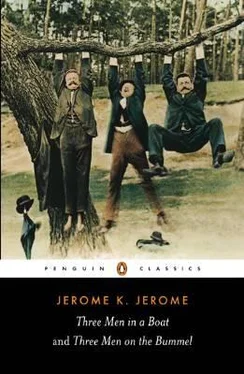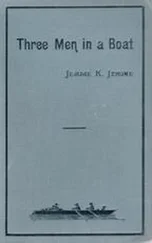Jerome Jerome - Three Men on the Bummel
Здесь есть возможность читать онлайн «Jerome Jerome - Three Men on the Bummel» весь текст электронной книги совершенно бесплатно (целиком полную версию без сокращений). В некоторых случаях можно слушать аудио, скачать через торрент в формате fb2 и присутствует краткое содержание. Жанр: Юмористическая проза, на английском языке. Описание произведения, (предисловие) а так же отзывы посетителей доступны на портале библиотеки ЛибКат.
- Название:Three Men on the Bummel
- Автор:
- Жанр:
- Год:неизвестен
- ISBN:нет данных
- Рейтинг книги:4 / 5. Голосов: 1
-
Избранное:Добавить в избранное
- Отзывы:
-
Ваша оценка:
- 80
- 1
- 2
- 3
- 4
- 5
Three Men on the Bummel: краткое содержание, описание и аннотация
Предлагаем к чтению аннотацию, описание, краткое содержание или предисловие (зависит от того, что написал сам автор книги «Three Men on the Bummel»). Если вы не нашли необходимую информацию о книге — напишите в комментариях, мы постараемся отыскать её.
Three Men on the Bummel — читать онлайн бесплатно полную книгу (весь текст) целиком
Ниже представлен текст книги, разбитый по страницам. Система сохранения места последней прочитанной страницы, позволяет с удобством читать онлайн бесплатно книгу «Three Men on the Bummel», без необходимости каждый раз заново искать на чём Вы остановились. Поставьте закладку, и сможете в любой момент перейти на страницу, на которой закончили чтение.
Интервал:
Закладка:
If things were going too smoothly, the eldest boy would come out with some tale about all the clocks in the house being five minutes slow, and of his having been late for school the previous day in consequence. This would send my uncle rushing impetuously down to the gate, where he would recollect that he had with him neither his bag nor his umbrella. All the children that my aunt could not stop would charge after him, two of them struggling for the umbrella, the others surging round the bag. And when they returned we would discover on the hall table the most important thing of all that he had forgotten, and wondered what he would say about it when he came home.
We arrived at Waterloo a little after nine, and at once proceeded to put George's experiment into operation. Opening the book at the chapter entitled "At the Cab Rank," we walked up to a hansom, raised our hats, and wished the driver "Good-morning."
This man was not to be outdone in politeness by any foreigner, real or imitation. Calling to a friend named "Charles" to "hold the steed," he sprang from his box, and returned to us a bow, that would have done credit to Mr. Turveydrop himself. Speaking apparently in the name of the nation, he welcomed us to England, adding a regret that Her Majesty was not at the moment in London.
We could not reply to him in kind. Nothing of this sort had been anticipated by the book. We called him "coachman," at which he again bowed to the pavement, and asked him if he would have the goodness to drive us to the Westminster Bridge road.
He laid his hand upon his heart, and said the pleasure would be his.
Taking the third sentence in the chapter, George asked him what his fare would be.
The question, as introducing a sordid element into the conversation, seemed to hurt his feelings. He said he never took money from distinguished strangers; he suggested a souvenir-a diamond scarf pin, a gold snuffbox, some little trifle of that sort by which he could remember us.
As a small crowd had collected, and as the joke was drifting rather too far in the cabman's direction, we climbed in without further parley, and were driven away amid cheers. We stopped the cab at a boot shop a little past Astley's Theatre that looked the sort of place we wanted. It was one of those overfed shops that the moment their shutters are taken down in the morning disgorge their goods all round them. Boxes of boots stood piled on the pavement or in the gutter opposite. Boots hung in festoons about its doors and windows. Its sun-blind was as some grimy vine, bearing bunches of black and brown boots. Inside, the shop was a bower of boots. The man, when we entered, was busy with a chisel and hammer opening a new crate full of boots.
George raised his hat, and said "Good-morning."
The man did not even turn round. He struck me from the first as a disagreeable man. He grunted something which might have been "Good-morning," or might not, and went on with his work.
George said: "I have been recommended to your shop by my friend, Mr. X."
In response, the man should have said: "Mr. X. is a most worthy gentleman; it will give me the greatest pleasure to serve any friend of his."
What he did say was: "Don't know him; never heard of him."
This was disconcerting. The book gave three or four methods of buying boots; George had carefully selected the one centred round "Mr. X," as being of all the most courtly. You talked a good deal with the shopkeeper about this "Mr. X," and then, when by this means friendship and understanding had been established, you slid naturally and gracefully into the immediate object of your coming, namely, your desire for boots, "cheap and good." This gross, material man cared, apparently, nothing for the niceties of retail dealing. It was necessary with such an one to come to business with brutal directness. George abandoned "Mr. X," and turning back to a previous page, took a sentence at random. It was not a happy selection; it was a speech that would have been superfluous made to any bootmaker. Under the present circumstances, threatened and stifled as we were on every side by boots, it possessed the dignity of positive imbecilitiy. It ran:— "One has told me that you have here boots for sale."
For the first time the man put down his hammer and chisel, and looked at us. He spoke slowly, in a thick and husky voice. He said:
"What d'ye think I keep boots for-to smell 'em?"
He was one of those men that begin quietly and grow more angry as they proceed, their wrongs apparently working within them like yeast.
"What d'ye think I am," he continued, "a boot collector? What d'ye think I'm running this shop for-my health? D'ye think I love the boots, and can't bear to part with a pair? D'ye think I hang 'em about here to look at 'em? Ain't there enough of 'em? Where d'ye think you are-in an international exhibition of boots? What d'ye think these boots are-a historical collection? Did you ever hear of a man keeping a boot shop and not selling boots? D'ye think I decorate the shop with 'em to make it look pretty? What d'ye take me for-a prize idiot?"
I have always maintained that these conversation books are never of any real use. What we wanted was some English equivalent for the well-known German idiom: "Behalten Sie Ihr Haar auf."
Nothing of the sort was to be found in the book from beginning to end. However, I will do George the credit to admit he chose the very best sentence that was to be found therein and applied it. He said:.
"I will come again, when, perhaps, you will have some more boots to show me. Till then, adieu!"
With that we returned to our cab and drove away, leaving the man standing in the centre of his boot-bedecked doorway addressing remarks to us. What he said, I did not hear, but the passers-by appeared to find it interesting.
George was for stopping at another boot shop and trying the experiment afresh; he said he really did want a pair of bedroom slippers. But we persuaded him to postpone their purchase until our arrival in some foreign city, where the tradespeople are no doubt more inured to this sort of talk, or else more naturally amiable. On the subject of the hat, however, he was adamant. He maintained that without that he could not travel, and, accordingly, we pulled up at a small shop in the Blackfriars Road.
The proprietor of this shop was a cheery, bright-eyed little man, and he helped us rather than hindered us.
When George asked him in the words of the book, "Have you any hats?" he did not get angry; he just stopped and thoughtfully scratched his chin.
"Hats," said he. "Let me think. Yes"-here a smile of positive pleasure broke over his genial countenance-"yes, now I come to think of it, I believe I have a hat. But, tell me, why do you ask me?"
George explained to him that he wished to purchase a cap, a travelling cap, but the essence of the transaction was that it was to be a "good cap."
The man's face fell.
"Ah," he remarked, "there, I am afraid, you have me. Now, if you had wanted a bad cap, not worth the price asked for it; a cap good for nothing but to clean windows with, I could have found you the very thing. But a good cap-no; we don't keep them. But wait a minute," he continued,-on seeing the disappointment that spread over George's expressive countenance, "don't be in a hurry. I have a cap here"-he went to a drawer and opened it-"it is not a good cap, but it is not so bad as most of the caps I sell."
He brought it forward, extended on his palm.
"What do you think of that?" he asked. "Could you put up with that?"
George fitted it on before the glass, and, choosing another remark from the book, said:
"This hat fits me sufficiently well, but, tell me, do you consider that it becomes me?"
The man stepped back and took a bird's-eye view.
"Candidly," he replied, "I can't say that it does."
Читать дальшеИнтервал:
Закладка:
Похожие книги на «Three Men on the Bummel»
Представляем Вашему вниманию похожие книги на «Three Men on the Bummel» списком для выбора. Мы отобрали схожую по названию и смыслу литературу в надежде предоставить читателям больше вариантов отыскать новые, интересные, ещё непрочитанные произведения.
Обсуждение, отзывы о книге «Three Men on the Bummel» и просто собственные мнения читателей. Оставьте ваши комментарии, напишите, что Вы думаете о произведении, его смысле или главных героях. Укажите что конкретно понравилось, а что нет, и почему Вы так считаете.










